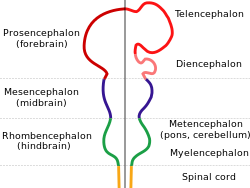Holoprosencephaly

Editor-In-Chief: Prab R Tumpati, MD
Obesity, Sleep & Internal medicine
Founder, WikiMD Wellnesspedia &
W8MD's medical weight loss NYC, sleep center NYC
Philadelphia medical weight loss and Philadelphia sleep clinics
| Holoprosencephaly | |
|---|---|

| |
| Synonyms | N/A |
| Pronounce | N/A |
| Specialty | N/A |
| Symptoms | Facial dysmorphism, Cleft lip and palate, Cyclopia, Microcephaly |
| Complications | Developmental delay, Seizures, Endocrine disorders |
| Onset | Prenatal |
| Duration | Lifelong |
| Types | N/A |
| Causes | Genetic mutations, Chromosomal abnormalities, Environmental factors |
| Risks | Maternal diabetes, Alcohol consumption during pregnancy, Retinoic acid exposure |
| Diagnosis | Prenatal ultrasound, MRI, Genetic testing |
| Differential diagnosis | Septo-optic dysplasia, Agenesis of the corpus callosum, Microcephaly |
| Prevention | N/A |
| Treatment | Supportive care, Surgical intervention, Hormone replacement therapy |
| Medication | N/A |
| Prognosis | Varies widely; often poor in severe cases |
| Frequency | 1 in 10,000 to 20,000 live births |
| Deaths | N/A |

Holoprosencephaly is a congenital disorder that affects the development of the brain in the early stages of pregnancy. This condition is characterized by the failure of the prosencephalon (the forebrain of the embryo) to develop. As a result, the brain does not divide into two hemispheres, leading to defects in the structure and function of the brain.
Causes[edit]
Holoprosencephaly is caused by a combination of genetic and environmental factors. Mutations in certain genes, such as SHH, ZIC2, SIX3, and TGIF1, have been associated with this condition. Environmental factors, such as maternal diabetes, alcohol use during pregnancy, and certain infections, can also increase the risk of holoprosencephaly.
Symptoms[edit]
The symptoms of holoprosencephaly can vary widely, depending on the severity of the brain malformation. In severe cases, symptoms can include microcephaly (small head size), hydrocephalus (buildup of fluid in the brain), seizures, and intellectual disability. In milder cases, symptoms can include hypotelorism (closely spaced eyes), cleft lip and/or cleft palate, and mild learning disabilities.
Diagnosis[edit]
Holoprosencephaly can often be diagnosed before birth through ultrasound imaging. After birth, the diagnosis can be confirmed through magnetic resonance imaging (MRI) or computed tomography (CT) scans of the brain.
Treatment[edit]
There is currently no cure for holoprosencephaly. Treatment is supportive and depends on the symptoms. This can include medications to manage seizures, shunt surgery for hydrocephalus, and therapies to address developmental delays.
Prognosis[edit]
The prognosis for individuals with holoprosencephaly depends on the severity of the brain malformation. Those with severe forms of the condition often do not survive past infancy. Those with milder forms can live into adulthood, but may have intellectual and physical disabilities.
See also[edit]
Ad. Transform your life with W8MD's Budget GLP-1 injections from $75


W8MD offers a medical weight loss program to lose weight in Philadelphia. Our physician-supervised medical weight loss provides:
- Weight loss injections in NYC (generic and brand names):
- Zepbound / Mounjaro, Wegovy / Ozempic, Saxenda
- Most insurances accepted or discounted self-pay rates. We will obtain insurance prior authorizations if needed.
- Generic GLP1 weight loss injections from $75 for the starting dose.
- Also offer prescription weight loss medications including Phentermine, Qsymia, Diethylpropion, Contrave etc.
NYC weight loss doctor appointmentsNYC weight loss doctor appointments
Start your NYC weight loss journey today at our NYC medical weight loss and Philadelphia medical weight loss clinics.
- Call 718-946-5500 to lose weight in NYC or for medical weight loss in Philadelphia 215-676-2334.
- Tags:NYC medical weight loss, Philadelphia lose weight Zepbound NYC, Budget GLP1 weight loss injections, Wegovy Philadelphia, Wegovy NYC, Philadelphia medical weight loss, Brookly weight loss and Wegovy NYC
|
WikiMD's Wellness Encyclopedia |
| Let Food Be Thy Medicine Medicine Thy Food - Hippocrates |
Medical Disclaimer: WikiMD is not a substitute for professional medical advice. The information on WikiMD is provided as an information resource only, may be incorrect, outdated or misleading, and is not to be used or relied on for any diagnostic or treatment purposes. Please consult your health care provider before making any healthcare decisions or for guidance about a specific medical condition. WikiMD expressly disclaims responsibility, and shall have no liability, for any damages, loss, injury, or liability whatsoever suffered as a result of your reliance on the information contained in this site. By visiting this site you agree to the foregoing terms and conditions, which may from time to time be changed or supplemented by WikiMD. If you do not agree to the foregoing terms and conditions, you should not enter or use this site. See full disclaimer.
Credits:Most images are courtesy of Wikimedia commons, and templates, categories Wikipedia, licensed under CC BY SA or similar.
Translate this page: - East Asian
中文,
日本,
한국어,
South Asian
हिन्दी,
தமிழ்,
తెలుగు,
Urdu,
ಕನ್ನಡ,
Southeast Asian
Indonesian,
Vietnamese,
Thai,
မြန်မာဘာသာ,
বাংলা
European
español,
Deutsch,
français,
Greek,
português do Brasil,
polski,
română,
русский,
Nederlands,
norsk,
svenska,
suomi,
Italian
Middle Eastern & African
عربى,
Turkish,
Persian,
Hebrew,
Afrikaans,
isiZulu,
Kiswahili,
Other
Bulgarian,
Hungarian,
Czech,
Swedish,
മലയാളം,
मराठी,
ਪੰਜਾਬੀ,
ગુજરાતી,
Portuguese,
Ukrainian


